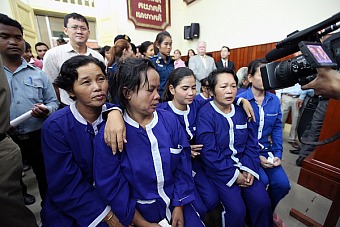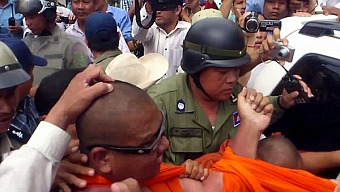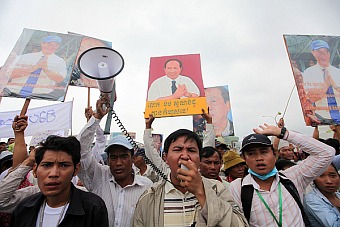2012 in Review: The Judiciary, a Useful Weapon to Silence Critics
Published on 14 February 2013As part of the lead up to the release of our report “Human Rights 2012: the Year in Review,” on February 18, LICADHO is publishing a four-part web series reviewing the key human rights of 2012. Daily installments will be published throughout the week, culminating with the publication of our report on February 18.
Authorities continue to resort to the judicial system to silence those who assert their rights or question entrenched interests. Throughout 2012, court summonses and the threat of arrest were increasingly used to intimidate human rights defenders.
For example, on February 20, 2012, ADHOC staff member, Soum Chankea, was summoned to court for questioning on a criminal charge of “slanderous denunciation” under Article 311 of the Penal Code. The summons was reportedly related to ADHOC’s intervention in a case of a waitress who reported being sexually harassed and molested by Oum Socheath, the head of the Banteay Meanchey branch of the Cambodian Mine Action Centre (CMAC). The criminal complaint against Soum Chankea was dropped on May 8, but there is no doubt that the summoning for questioning was directly related to his work in assisting victims of human rights violations.
The only thing more shocking than their arrests was their convictions
On May 22, 13 female activists from the Boeung Kak Lake community were arrested after a peaceful demonstration over a land dispute that has already led to the displacement of over 3,500 families. They had been protesting for hours, but weren’t arrested until some had the audacity to break out into song.
The only thing more shocking than their arrests was their convictions. A mass trial of all 13 activists was convened two days after their arrest. The group entered the court as suspects, and within hours left as convicted felons. Lawyers for the activists requested a delay in the proceedings, but were denied. The lawyers were also refused access to the case file and state evidence. They were not even permitted to call witnesses.
All the women were summarily convicted of “illegal occupation of land” and “obstruction of public officials with aggravating circumstances” and sentenced to two-and-a-half years in prison. Outside the court, two more Boeung Kak residents were arrested and the activist monk, Loun Sovath, was surrounded by religious and civilian authorities and forced into a Land Cruiser. He was driven to a local pagoda where he was threatened with defrocking and criminal charges unless he stopped advocating for human rights victims. In recognition for his work, Venerable Sovath was awarded the 2012 Martin Ennals Award for Human Rights Defenders on Oct. 2, becoming the first Cambodian ever to win the prestigious honor, known colloquially as the “Nobel Prize for human rights.” Sovath is the first Buddhist monk and first Southeast Asian to win the award.
Following an extensive national and international advocacy campaign, aided by LICADHO, the Court of Appeals released the Boeung Kak 13 after one month and three days of detention. Nonetheless, the charges were not dropped, the sentence was merely suspended, meaning that the 13 women still have a criminal record for offenses they did not commit. The battle is not over as the women are planning to appeal the conviction at the Supreme Court. LICADHO lawyers have represented the women through the entire process.
Unfortunately, even the joy associated with the Boeung Kak women’s release was tainted by government violence. While the appeals hearing proceeded, anti-riot intervention police were mobilized to prevent Boeung Kak residents and others from reaching the court. As a group of the women’s children tried to rush through the roadblock, the police officers turned violent, injuring five villagers and seven children who had to receive medical treatment. Amongst the victims was a woman – the sister of one of the jailed representatives – who had a miscarriage after being kicked in the stomach by a police officer. Her stay at the hospital was facilitated by LICADHO’s medical team.
A Summer of Retribution
The modest victory in the case of the Boeung Kak 13 was short-lived, however, as the human rights situation took a turn for the worse in the following months.
On June 25, 2012, Beehive Radio, one of Cambodia’s few independent radio stations, broadcast a report on a “communication” submitted to the International Criminal Court accusing officials in the Cambodian government of crimes against humanity related to forced displacements and evictions. Twenty-four hours after the Beehive report first aired, Prime Minister Hun Sen publicly called for Sonando’s arrest during a nationally-televised speech.
By July 2, 2012, an arrest warrant had been issued by Kratie province investigating judge Chok Nguon, accusing Sonando of crimes related to a so-called “secession” movement in Kratie province – the same unsubstantiated plot that led authorities to raid Broma village and kill a 14-year-old girl. Since at least January 2012, the residents of Broma have been embroiled in a well-publicized and escalating land dispute with Casotim, a well-connected private company that holds of a 15,000-hectare land concession near their village. Several villagers were members of an NGO founded by Sonando called the Association of Democrats.
Sonando was arrested on July 15, and detained under an array of criminal charges including participation in an insurrectionary movement, inciting people to take up arms against the state, and obstruction of public officials. It was the third time he had been arrested on politically-motivated charges since 2003.
On October 1, Sonando was convicted and sentenced to 20 years in prison. The evidence presented for the secession plot included a collection of crude farm tools which authorities claim villagers were planning to use to defeat Cambodian forces. The national and international communities erupted in protest following the conviction, but Sonando remains in prison as of the end of 2012.
A human rights NGO staff member was also drawn into the Kratie affair in August, when the Phnom Penh municipal court issued a summons for Chan Soveth, a long-time human rights worker from the Cambodian Human Rights and Development Association (ADHOC) since 1995. Soveth, who was well-known as an outspoken critic of the government, was called by the court for questioning related to alleged assistance he provided to one of the suspects in the case.
... the boldest attack against human rights work that we’ve seen in a decade.
The summons was issued less than two weeks after a nationally-televised speech by the Prime Minister in which he implored an unnamed NGO worker to “confess” for his role in aiding the Kratie villagers. During the speech, the Prime Minister turned to his staff and asked “Has he been called for questioning? Not yet? Not yet called …” Records indicate that the criminal case against Soveth was opened a mere 48 hours after the Prime Minister’s speech. A coalition of civil society organizations, including LICADHO, called the summons “the boldest attack against human rights work that we’ve seen in a decade” and “nothing short of an attempt to criminalize legitimate NGO activities.” Soveth appeared in court on December 24 and was not charged, though his case is still pending.
As the Kratie saga unfolded, two prominent land activists – Yorm Bopha of the Boeung Kak community and Tim Sakmony of Borei Keila – were arrested and placed in pretrial detention within 24 hours of each other in September. Amnesty International declared both women prisoners of conscience in December.
Bopha was arrested for allegedly assaulting a motodop who witnesses claim had repeatedly vandalized her property. Evidence presented at trial showed she was not involved in the incident. She was sentenced to three years in prison on December 26 – another inmate in a prison system that is crumbling under the weight of holding nearly two times the number of prisoners it is designed for.
Sakmony was arrested for allegedly filing false documents on behalf of her disabled adult son - a victim of Phanimex’s malfeasance at Borei Keila. There is no evidence suggesting that the claim was falsified in any way. Meanwhile, Phanimex unilaterally pulled out of its deal to build housing for evicted residents. The company was contractually obligated to build 10 buildings, but only built eight.
On December 26, Sakmony was sentenced to time served and was released from prison.
On the same day Born Samnang and Sok Sam Oeun – two men accused of killing union leader Chea Vichea in 2004 – were re-arrested and imprisoned after the court of appeal reheard their case. The pair, widely believed to have been framed as scapegoats, had been freed in December 2008 by a courageous Supreme Court, in a decision which ordered further investigation into the killing amid extensive evidence of their innocence. Without hearing any new evidence of guilt during the rehearing in November 2012, the court of appeal ordered them back to prison to serve the remainder of their 20-year sentences.
MP3 format: Listen to audio version in Khmer
- Topics
- Judiciary/Rule of Law










